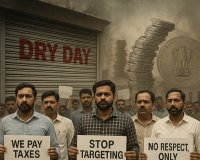- Editorial
- "Not Just a Matter of Two, Four or Ten – A Debate on Inclusion and Exclusion"
"Not Just a Matter of Two, Four or Ten – A Debate on Inclusion and Exclusion"

By Ramesh Kulkarni, 9922901262
The Economics Behind the Drama
Economics is a fascinating and often paradoxical science. Whether one understands it deeply or not, everyone is constantly striving to grasp its core idea—“money rules the world.” The discipline of economics spins around this central truth. Every individual desires financial stability, and for that, fiscal discipline is essential. Whenever this discipline breaks down, the consequences escalate—and the pain of economic setbacks becomes unavoidable.
A basic economic rule says: when income is low and expenses are high, the structure cannot survive for long.Maharashtra’s government is no exception to this rule. Today, the state is witnessing the fallout of populist schemes launched with elections in mind. The Marathi proverb “You can't fake having money” is being tested in real time. The current financial turmoil is a result of deliberate political choices. Though such decisions may have offered short-term electoral gains, they now threaten to erode the state's treasury over the long term.
This impact is now visible: payments to contractors are delayed, salaries are held back, subsidies fall short, and development funds are slashed. These are all signs that the illusion of abundant funds is crumbling.
Maharashtra's Fiscal Tightrope
The state is now trying to discover new sources of revenue, desperately attempting to ease its budgetary strain. In financial distress, governments tend to look for “soft targets.” We saw this clearly during the COVID-19 crisis. And predictably, liquor consumers are often the first to be targeted. The responsibility of refilling the state's coffers is laid on their shoulders.
“Bar and Permit Room” establishments—often frequented by alcohol consumers to unwind—have now come under attack. Permit room owners have always been an easy target for the government. Recently, the license renewal fees for these establishments were hiked by 15%, and before they could recover, the VAT on liquor was doubled—from 5% to 10%.
To make matters worse, Maharashtra also imposed a 60% increase in excise duty on imported foreign liquor produced within the state. Naturally, the cost burden falls directly on the consumers.
Alcohol, lacking social respectability, sees no vocal opposition to price hikes. The state anticipated that these increases would go unnoticed—but this assumption may prove dangerous. Illicit liquor trade may spike, leading to public health hazards, and possibly even fatalities.
Bar Owners’ Lament
Bar owners voice a deep sense of injustice:
“We lack social respectability despite contributing to economic growth. People wrongly assume we are rich, but they ignore the debt we carry. No one notices how we struggle with loans, or how many people we employ. Excise revenue ranks fourth among Maharashtra’s revenue streams. Still, we are not even recognized as legitimate businessmen.”
“We fund festivals, public celebrations, and community events, but society continues to treat us with disdain. No one tries to understand our side of the story.”
This frustration has now translated into collective action. The Permit Room Owners Association organized a massive protest—a first in Maharashtra’s history. All 21,000 bar owners across the state, including 6,500 in Vidarbha, took to the streets. They shut their establishments for the day, observed a complete “Dry Day,” and held a large-scale protest rally.
Despite this, the government appears unmoved. In fact, it is reportedly considering issuing 328 new liquor shop licenses—a move that the association says is like “rubbing salt on wounds.”
A Clash of Revenue vs Reality
The government assumes that its new liquor tax policy will boost revenue. But the association disagrees. They estimate a 25%–40% drop in customer base due to the price hikes, leading to reduced revenue overall. With rising expenses and falling income, many bars fear financial collapse. This could lead to rising unemployment, as several ancillary businesses depend on the bar industry.
Smuggling and Illegal Sales May Rise
Let’s be clear: glorifying or supporting alcohol is not the point here. Alcohol addiction has destroyed countless families. Financial ruin, debt, domestic violence, rising accidents, and health crises—all are deeply linked to alcohol abuse. It is a social disease, and those suffering from it deserve empathetic treatment, not punishment.
However, mere prohibition or tax increases will not solve the problem. In fact, they might create new ones, potentially harmful to the social and mental health of society.
There’s also a policy inconsistency—India lacks a unified national liquor policy. Recent examples like the Delhi liquor policy scam have shown how mismanagement can lead to legal trouble and electoral backlash—as was the case when the public voted out the government involved in that scandal.
Despite all this, bar owners too deserve a fair hearing. They must be allowed to voice their position, even if the general perception is stacked against them. Their argument might be best captured in poet Asad Multani’s verse:
“Liquor bans aren’t just the bartender’s responsibility. The whole city’s involved—it’s not just about two, four, or ten people.”
000







.png)

